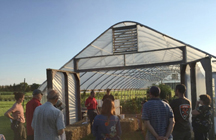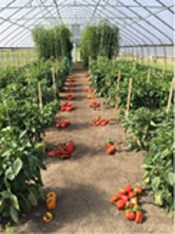Willsboro, NY; April 16, 2018: Growers who are first to market with peppers, tomatoes, and other fresh market vegetables have a distinct advantage. Earlier spring crops, double yields, and the potential for $1390 in added net revenue are among the results noted in the 2017 vegetable production research report posted at www.nnyagdev.org by the farmer-driven Northern New York Agricultural Development Program.
A 2017 Northern New York Agricultural Development Program-funded research project led by Cornell Cooperative Extension vegetable specialist Amy Ivy evaluated the time, labor, yield, and income opportunity associated with growing red peppers, cherry tomatoes, and spinach under the growing conditions unique to Northern New York.
Peppers, including new varieties said to be extra-productive, grown inside a high tunnel at the Willsboro Research Farm in Willsboro, NY, averaged 4.98 lbs/plant with first harvest on August 23, extending through November 3. By comparison, field-grown peppers averaged 2.19 lbs/plant with first harvest on September 9 and last harvest before a killing frost on October 17.
In the pepper variety comparison within an unheated high tunnel, one variety yielded earlier in the spring and tapered off, the other yielded later and slightly higher but at a time when market demand was less.
In a comparison of pepper pruning and training systems, one system took less time and yielded a 1.5 lbs-more-per-plant average.
“The peppers clearly benefitted from the protection of a high tunnel, with more than double the production and a significantly earlier first harvest. Harvest timing is an important factor for peak sales and profitability in Northern New York,” Ivy noted.
The NNYADP-funded cherry tomato trial compared three systems for training and pruning cherry tomatoes, known for rampant growth, the managing of which can drain grower efficiency.

“Because labor is the largest expense on most vegetable farms, increasing our understanding of practices that can add production and harvesting efficiency is critical. These trials funded by the Northern New York Agricultural Development Program do that for our regional growers,” Ivy said.
The cherry tomato trial data showed the labor commitment varied by system; for example, for harvesting from 34.8 lbs/hr to 45.1 lbs/hr. Tomato yield by system ranged from 11.3 lbs plant to 15.8 lbs/plant. Average net revenue by system ranged from $39.27 per plant to $55.31 per plant.
“Our calculations determined the system providing the greatest benefits as measured by labor efficiency, yield, and net revenue was a double leader system. A high tunnel with 200 cherry tomato plants could see a possible gain of $1390 in net profit using this system compared to the less intensive multi-leader system,” Ivy noted.
The results of an evaluation of the availability of nitrogen from various sources in cold soils to support winter spinach production will be posted later this spring.
This research supports the increasing demand for fresh market vegetables in Northern New York as evidenced by a new Produce Auction in Franklin County, a food hub project in Jefferson County, and the addition of high tunnels on farms regionwide.
The Northern New York Agricultural Development Program-funded vegetable research in 2018 includes the high tunnel production of red peppers, green beans, self-fertile zucchini, and winter spinach.
Funding for the Northern New York Agricultural Development Program is supported by the New York State Senate and administered by the New York State Department of Agriculture and Markets. Learn more in research reports posted on this website.




